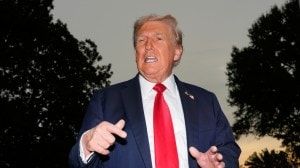IOA plays ostrich: athletes guilty but coaches, officials are clean
As expected, the Indian Olympic Association today upheld the guilty verdict on 21 sportsmen — the case of one is in appeal — charg...

As expected, the Indian Olympic Association today upheld the guilty verdict on 21 sportsmen — the case of one is in appeal — charged with doping at the last National Games. And, as also expected, reacted to the biggest scandal of its kind in Indian sport by letting every official — coach, doctor, federation office-bearer — off the hook.
The scale of the scandal cannot be overstressed: the 22 sportspersons were from six disciplines and included 15 medal-winners. It is inconceivable that doping on such scale takes place without the knowledge, if not active participation, of any official. Yet the IOA was unwilling to countenance such a possibility.
|
IOA’S DRUG PRESCRIPTION
|
||
|
• 21 out of the 22, athletes who tested positive for banned drugs during the National Games in Hyderabad, were pronounced guilty by the IOA |
In typically ostrich-like fashion, IOA president Suresh Kalmadi, who is also the head of the Amateur Athletic Federaton of India (AAFI), ruled out any action against coaches of the guilty athletes saying, instead: ‘‘From now on we will keep an eye on the coaches also.’’
The chairman of the Anti-Doping Commission, Manmohan Singh, was more specific: they would not consider action against officials and coaches unless the athletes approach them with names. ‘‘None of the athletes who were questioned by us complained about their coaches or officials.’’
The statement appears to be an affirmation of the IOA’s see-no-evil position on doping, a policy that is likely to do more harm than good to Indian sport. It provoked strong words from experts and former athletes, who said the menace cannot be checked unless action is taken against federations and their officials.
Coaches and officials, said Milkha Singh, are the main culprits behind doping since they want to show quick results and the athlete is misguided by them. ‘‘Unless the officials concerned with the federation and coaches are not punished, this disease cannot be stopped. It’s completely wrong to put the blame on athletes. They cannot be taking drugs on their own without the support of the federation and coaches,’’ he told The Indian Express.
Sushil Salwan, the lawyer who headed the one-man inquiry committee in the Sunita Rani case, says there is every chance that the fight against drugs will be lost unless officials are made responsible.
‘‘Just punishing the athletes is unfair. Why can’t we hang the guilty officials and coaches of their respective federation? The officials are making sportspersons the scapegoats, it’s just an alibi for them to say that they have taken action and their job is complete.’’
Salwan also questioned the role of the Anti-Doping Commission, which functions under the IOA. ‘‘Even if none of the athlete makes an official complaint about the coaches or officials, why is the Anti-Doping Commission not going into the entire aspect. Twenty-two cases is not a small number.’’
Salwan drew on his expertise in the matter while arguing why athletes can’t be alone in the process. ‘‘There is pressure on them. First to take drugs from coaches and officials, then, when they are caught, there is pressure not to disclose the names of officials and coaches. No athlete will take drugs without the knowledge of the coaches, doctors and officials.’’
Given that the biggest defaulters are from athletics (eight) and weigtlifting (seven) — more than half of the total — Salwan believes a committee comprising people not linked with any federations should probe the roles of the officials of these two federations.



- 01
- 02
- 03
- 04
- 05



























